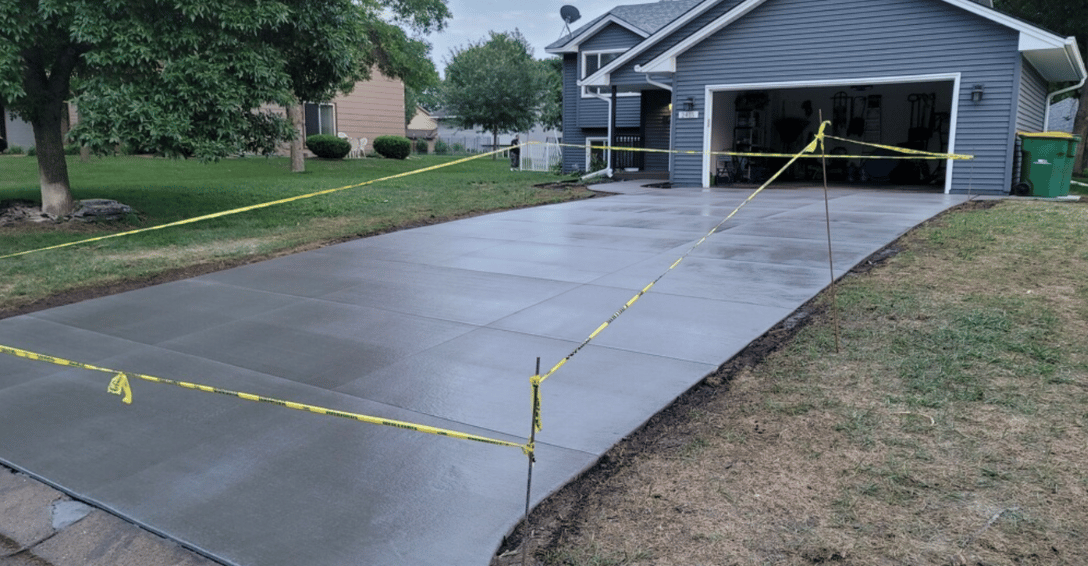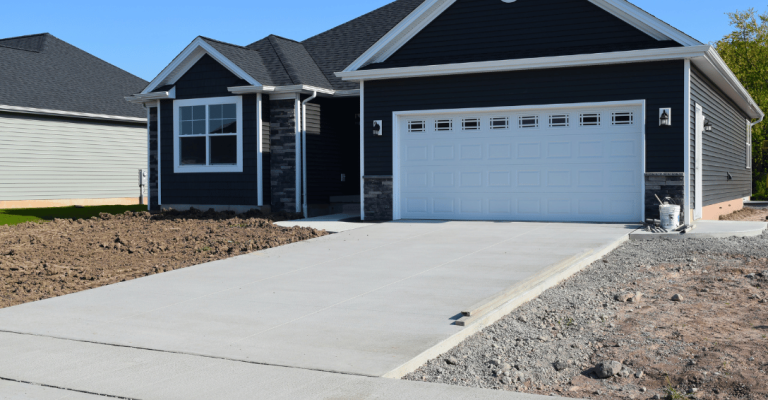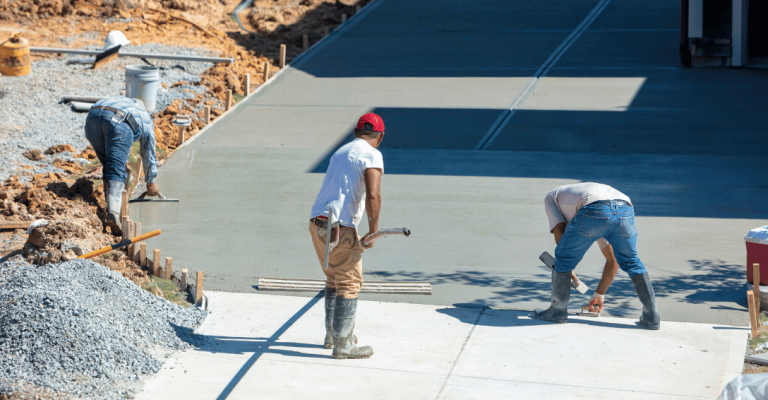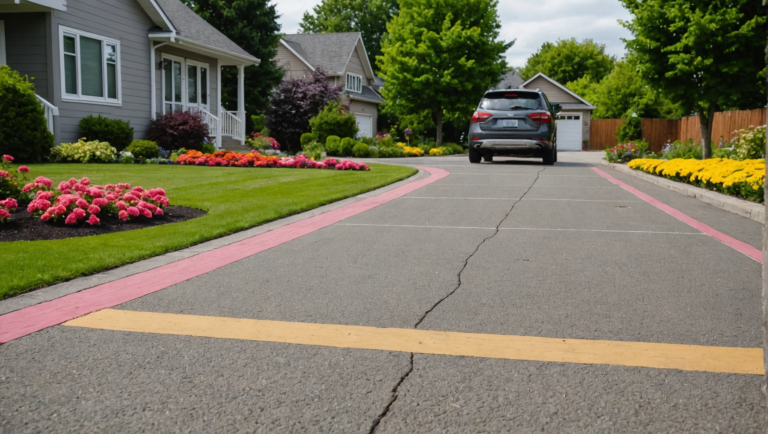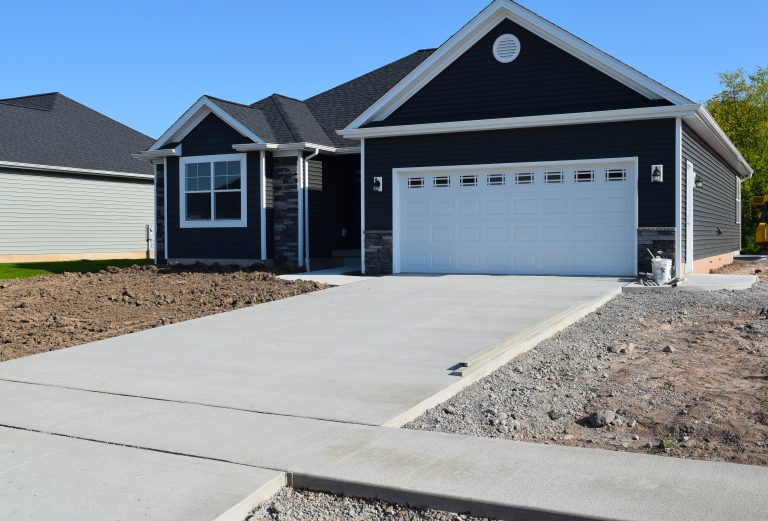DIY Vs Professional Concrete Driveway Installation: Exploring the Benefits
As homeowners, the decision of installing a concrete driveway on your own or seeking professional help can be a intricate one. Both DIY and professional concrete driveway installation present distinct advantages that need to be carefully considered. How does the satisfaction and cost-effectiveness of a DIY project compare to the reliability and quality assurance offered by professionals? This discussion aims to provide a thorough comparison of these two options, setting the stage for a more informed decision-making process.
Understanding Concrete Driveway Installation
To fully comprehend the process of concrete driveway installation, it is important to familiarize oneself with the meticulous steps involved, from site preparation to the final sealing and curing of the concrete. This knowledge is vital to guarantee a successful project, whether executed by a professional contractor or as a do-it-yourself (DIY) task.
Site preparation is the initial phase of the process. This includes excavating the area, ensuring the ground is level, and installing a sub-base of compacted gravel for drainage and stability. This is followed by the installation of the formwork, which shapes the driveway and holds the concrete in place.
Next is the pouring of the concrete. This involves spreading and leveling the concrete mix to ensure a smooth and even surface. It is important to work swiftly before the concrete starts to harden. Once poured, the concrete is then smoothed using a float or trowel to create a uniform surface.
Lastly, the concrete needs to be sealed and cured. Sealing protects the concrete from moisture, while curing allows it to reach its full strength and durability. This process usually takes several days to a week.
Assessing DIY Installation Benefits
Engaging in DIY installation of concrete driveways can provide certain benefits, which we will now evaluate.
First, a significant factor to assess is the potential for cost savings when compared to professional installation.
Additionally, the opportunity for skill building and self-reliance, which are inherent in any DIY project, must also be examined.
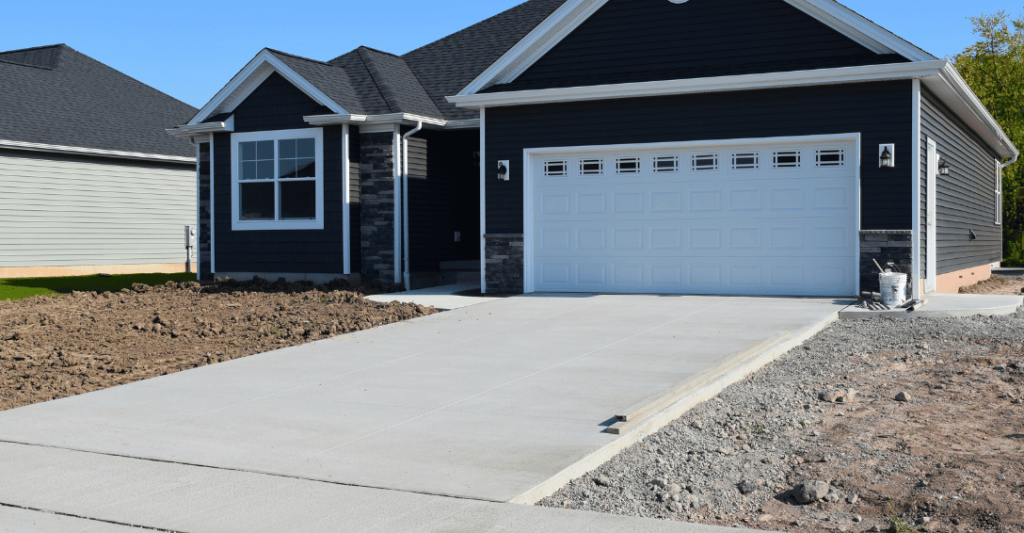
Cost Savings Analysis
Certainly, one of the most significant benefits of a DIY concrete driveway installation is the potential for substantial cost savings. This is mainly due to the exclusion of labor expenses, which can make up a significant portion of the total costs in a professional installation.
By undertaking the project yourself, you have control over the budget, buying only the necessary materials and avoiding the markups frequently included in professional estimates. This cost-effectiveness also applies to equipment rental, where savings can also be achieved. However, these savings may be negated if errors occur due to lack of expertise, leading to additional material purchases or repairs.
Additionally, there is an indirect aspect of cost-efficiency to take into account. By overseeing the project, you can make sure that the work is done according to your precise requirements, potentially preventing future repair or replacement costs linked to inferior professional work.
Skill Building Opportunities
Beyond potential cost savings, DIY concrete driveway installation presents a valuable opportunity for skill development and knowledge acquisition in the area of home improvement. The process promotes hands-on learning, fostering a deeper comprehension of construction techniques, materials, and safety measures.
Embarking on a DIY project such as this encourages the development of practical skills that can be beneficial in other areas of life. For instance, project management and problem-solving abilities are honed as you plan the project, procure materials, and navigate through any challenges that may arise. Engaging in physical work also boosts confidence and instills a sense of accomplishment that comes from seeing the tangible results of your labour.
Moreover, the knowledge acquired through this process can be shared within your community, thereby fostering a sense of belonging and mutual support.
The skills and knowledge gained from a DIY concrete driveway installation project can serve as a stepping stone for more extensive home improvement projects, leading to an enriched understanding of the built environment around us.
Common DIY Installation Challenges
While setting up a concrete driveway may appear straightforward, DIY enthusiasts often face a variety of challenges that can complicate the process. It’s vital to grasp these challenges to make an informed decision about whether to proceed with a DIY project or seek professional help.
One of the main challenges lies in the preparation of the ground. This step demands attention to detail and accuracy, as any irregularity can result in later complications. Ensuring that the ground is even, secure, and properly compacted is a meticulous task that necessitates specialized equipment and knowledge.
Additionally, the mixing and pouring of concrete is a delicate procedure. Maintaining the correct proportion of cement, sand, and aggregate is crucial, and the mixture must be poured swiftly before it starts to solidify. This can pose a particular challenge for those who lack experience or are working solo.
Moreover, the curing process is essential for the strength and longevity of the final driveway. It demands patience, as hastening this stage can result in premature cracking and a shorter lifespan for the driveway.
Deciphering Professional Installation Advantages
Shifting focus to the domain of professional installation, the advantages it offers are significant, particularly when compared to the challenges of DIY projects. The first and foremost advantage is expertise. Professional concrete installers possess the technical knowledge and experience to handle complex projects, ensuring a high-quality finish. They are well-versed in industry standards and regulations, guaranteeing compliance and mitigating the risk of future issues.
Another pivotal benefit is time-efficiency. Unlike DIY enthusiasts who may need to balance project work with other responsibilities, professionals dedicate their full attention to the task, completing it in a shorter time frame. This efficiency can save homeowners valuable time that can be better spent on other endeavors.
Additionally, professional installation often comes with warranties or guarantees, offering a sense of security. If issues arise post-installation, professionals can be held accountable and will rectify problems without additional costs. This accountability is a reassuring factor for homeowners, fostering a sense of trust and belonging in the professional-client relationship.
Potential Drawbacks of Professional Services
Despite the undeniable advantages of professional concrete driveway installation, there are potential drawbacks that homeowners must carefully consider. As part of a larger community of property owners, recognizing these concerns not only aids in making an informed decision but also fosters a sense of shared understanding.
One major drawback is the lack of personal control. Hiring professionals often means relinquishing direct oversight of the project. This can lead to miscommunications regarding design specifics, desired finish, or even the pace of the work. While professionals might bring their expertise, they might not fully align with your vision or pace for the project.
In addition, scheduling conflicts can arise. Professional contractors usually handle multiple projects simultaneously. Hence, your driveway installation may not be their top priority, potentially causing delays.
Finally, the risk of subpar work cannot be overlooked. Despite their professional standing, some contractors may cut corners or use inferior materials to save on costs. This could compromise the longevity and aesthetic appeal of your driveway.
Therefore, while professional services offer convenience and expertise, these potential drawbacks highlight the importance of thorough research and open communication when hiring a contractor.
Cost Comparison: DIY Vs Professional
Delving into the financial aspect of concrete driveway installation, the cost comparison between DIY and hiring a professional contractor presents a critical factor in homeowner decision-making.
When considering a DIY approach, the primary cost components include materials and equipment rental. The cost of concrete and other materials can be found at your local hardware store, while equipment rentals (such as a concrete mixer) may vary depending on the size of the project.
Hiring a professional contractor, on the other hand, wraps up the cost of labor, materials, and equipment into one package. This cost may be higher upfront but includes the assurance of expertise and often a warranty on the work.
Below is a simple table that compares the two approaches:
| DIY | Professional | |
|---|---|---|
| Materials | $ (Varies) | Included |
| Equipment Rental | $ (Varies) | Included |
| Labor | DIY Effort | Included |
This table shows the general cost divisions for both approaches. The actual costs can vary greatly based on the specific project details, including size and complexity. Remember that while DIY may appear cheaper, the value of your time, effort, and potential for error should also be considered.
Making the Right Choice for Your Home
When considering the installation of a concrete driveway, the decision between a DIY project and hiring a professional service is paramount. This choice will largely depend upon an evaluation of costs and benefits, a thorough understanding of the DIY process, and an appreciation for the advantages of professional installation.
The subsequent discussion aims to shed light on these aspects, thereby enabling homeowners to make an informed decision that best suits their specific needs and circumstances.
Evaluating Costs and Benefits
Understanding the financial and practical implications is crucial when deciding between a DIY and professional installation for your concrete driveway. Both options come with their own set of costs and benefits that impact the overall quality, longevity, and value of your driveway.
| DIY Installation | Professional Installation |
|---|---|
| Lower upfront costs, but potential for higher long-term costs due to repairs and maintenance. | Higher initial cost, but generally lower long-term costs as professionals often provide warranties and high-quality work. |
| Flexibility to work at your own pace and customize the process. | Guarantees a timely and efficient installation with minimal disruption to your daily routine. |
| Offers a sense of accomplishment and ownership. | Provides reassurance that the job is done correctly and to professional standards. |
Understanding the DIY Process
To make an informed decision about whether a DIY driveway installation suits your needs, it’s critical to comprehend the step-by-step process involved in laying concrete. The DIY process begins with meticulous planning. This includes measuring the driveway area, determining the amount of concrete required, and acquiring the necessary tools and materials.
Next, the area needs to be prepared. This involves removing any grass or vegetation, leveling the ground, and setting up wooden forms to shape the driveway. Once the groundwork is laid, a layer of sub-base material is added for reinforcement, followed by a mesh or rebar for additional strength.
The concrete mix is then prepared, usually in a rented concrete mixer, and poured into the forms. After leveling and smoothing the surface, it is left to cure for several days. Finally, a sealer is applied to protect the driveway from weather damage and wear and tear.
The DIY approach can give you a sense of accomplishment and control over the project. However, it requires significant time, effort, and expertise. Consider these factors and your comfort level with such projects to make the right choice for your home.
Professional Installation Advantages
While the DIY approach offers certain advantages, opting for a professional driveway installation provides a range of benefits that could make it the more suitable choice for your home. First and foremost, professionals possess the skills, knowledge, and experience that are vital for a high-quality installation. They are well-versed in the best practices of concrete placement, ensuring a smooth and durable driveway.
Moreover, professionals are equipped with the necessary tools and machinery to do the job efficiently and within the agreed timeline. They also have access to high-quality materials, which are essential to a long-lasting driveway.
Lastly, hiring a professional spares homeowners from the hard labor, safety risks, and potential mistakes associated with DIY installation. This leads to peace of mind, knowing that your investment is in capable hands.
| Professional Advantages | Description | Impact |
|---|---|---|
| Expertise | Professionals have the skill and experience | High-quality installation |
| Tools and Materials | Access to necessary equipment and high-quality materials | Efficient installation, durability |
| Peace of Mind | No need for hard labor and minimal risk of mistakes | Satisfaction, saved time & effort |
Choosing professional installation means joining a community that values quality, efficiency, and peace of mind in home improvement.
Frequently Asked Questions
How Long Does a Concrete Driveway Typically Last?
A concrete driveway, when installed professionally and maintained appropriately, can typically last between 25 to 30 years. The longevity largely depends on the quality of installation and the environmental conditions it is subjected to.
What Maintenance Does a Concrete Driveway Require?
Concrete driveways require routine maintenance to guarantee longevity and aesthetic appeal. This includes regular cleaning, immediate repair of cracks or chips, resealing every few years, and preventing heavy loads that may cause damage.
Can a Concrete Driveway Be Installed in Any Weather Conditions?
Concrete driveway installation requires specific weather conditions for best results. Preferably, it should be done in dry, mild weather as extreme cold or heat can affect the curing process, potentially leading to cracking or surface defects.
What Are Some Alternatives to a Concrete Driveway?
Alternative materials to concrete for driveway installation include asphalt, gravel, cobblestone, and brick. Each offers unique aesthetic options, durability, and maintenance requirements, providing a variety of choices to suit individual preferences and property styles.
Are There Environmentally-Friendly Options for Concrete Driveway Installations?
Yes, environmentally-friendly options for concrete driveways include permeable concrete that allows water to seep through, reducing runoff. Another option is recycled concrete, which reuses materials and reduces the environmental impact of new concrete production.

